

TL;DR - Cos'è un CRM WhatsApp?
Un CRM WhatsApp aiuta le aziende a gestire le conversazioni con i clienti, tracciare i dettagli e costruire relazioni direttamente su WhatsApp. Il modo più semplice e potente per farlo è attraverso respond.io, un fornitore ufficiale di soluzioni WhatsApp Business che funziona come il tuo CRM per WhatsApp. Collega WhatsApp al tuo CRM esistente, centralizza la cronologia di chat e chiamate e aggiunge automazione, IA e strumenti di instradamento che ai CRM tradizionali mancano.
Perché le aziende ne hanno bisogno: Aggiorna e consulta i dati dei clienti, automatizza la qualificazione e l'instradamento per convertire i lead più velocemente e in modo più efficace
Indispensabili per i CRM WhatsApp: Accesso all'API WhatsApp, strumenti di gestione dei lead, supporto per le chiamate WhatsApp, automazione, sicurezza dei dati e monitoraggio delle prestazioni.
Integra l'API di WhatsApp con un CRM: Ottieni un account respond.io, collega WhatsApp a qualsiasi CRM e inizia a chattare.
Hai bisogno di un CRM che si colleghi a WhatsApp? Oppure vuoi aggiungere WhatsApp al tuo CRM esistente? Abbiamo testato diverse soluzioni CRM per WhatsApp per aiutarti a prendere la decisione migliore possibile.
Questa guida spiega cos'è un CRM WhatsApp, perché la tua azienda ne ha bisogno e come integrare WhatsApp con un CRM in tre semplici passaggi. Esamineremo anche le funzionalità chiave, i principali aspetti da considerare, le migliori pratiche e metteremo in evidenza alcuni esempi reali.
Che cos'è un CRM WhatsApp?
Il CRM WhatsApp è l'integrazione tra WhatsApp API, nota anche come WhatsApp Business Platform, e un CRM. Le aziende lo utilizzano generalmente per uno dei due scopi principali:
Integrare WhatsApp con un CRM esistente.
Integrare WhatsApp con un software di messaggistica che supporti completamente le funzionalità dell'API WhatsApp e consenta l'integrazione con il CRM.
Qualunque approccio tu scelga, gestire i contatti WhatsApp è essenziale per le aziende che si affidano a WhatsApp per comunicare con lead e clienti.
Perché le aziende hanno bisogno di un CRM WhatsApp?
Con miliardi di persone che usano WhatsApp, è dove si trovano già i tuoi clienti. Un CRM WhatsApp ti aiuta a gestire queste conversazioni in modo più efficiente, mantenendo tutto organizzato, automatizzando attività e semplificando le comunicazioni.
Ecco come può migliorare le tue operazioni:
Riattiva i lead freddi con messaggi in blocco su WhatsApp, inclusi cataloghi di prodotti, per promozioni mirate.
Automatizza la qualificazione dei lead con l'IA: poni domande di qualificazione e assegna priorità ai lead più qualificati con facilità.
Instrada e assegna le conversazioni istantaneamente usando workflows automatizzati per collegare i clienti all'agente giusto al momento giusto.
Converti i lead più velocemente con risposte assistite dall'IA, integrazioni VoIP-CRM (incluse le chiamate WhatsApp) e persino Agenti IA.
Ma per ottenere questi benefici e altro, dovrai scegliere l'integrazione CRM WhatsApp che meglio si adatta alle esigenze della tua azienda, come respond.io.
Quale tipo di integrazione CRM WhatsApp è migliore per te?
Ora che sappiamo cosa puoi ottenere, la domanda successiva è: come dovresti integrare WhatsApp con il tuo CRM?
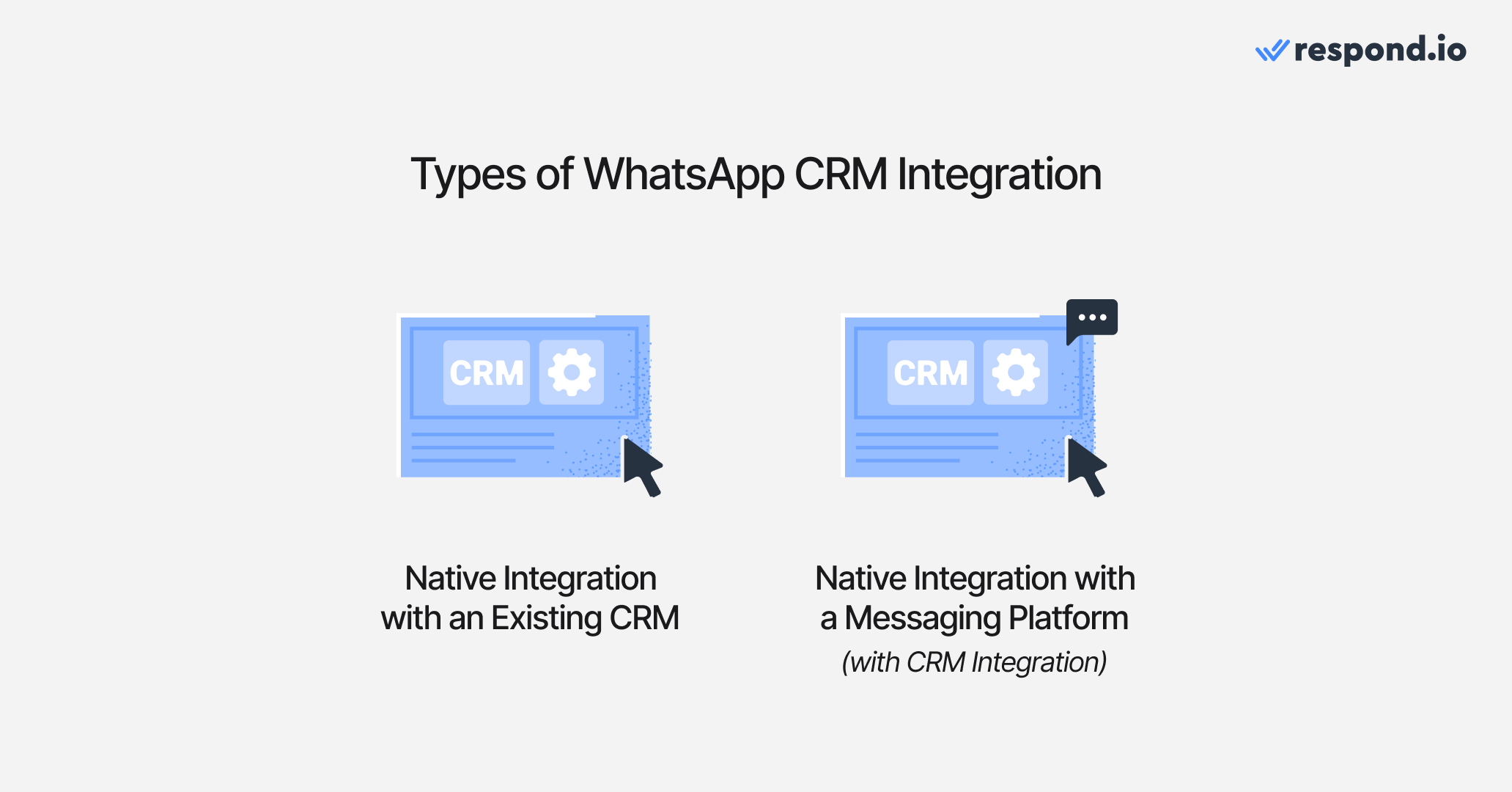
Ci sono due approcci principali:
1. Integrazione API WhatsApp con un CRM esistente
Le aziende che integrano WhatsApp con il loro CRM vogliono inviare e ricevere messaggi all'interno del loro sistema esistente. Mentre alcuni CRM, come Salesforce, HubSpot e Zendesk, offrono integrazioni native con WhatsApp, spesso mancano di funzionalità chiave per la messaggistica poiché sono stati progettati originariamente per le email.
Ad esempio, le integrazioni di HubSpot e Salesforce limitano le capacità di automazione, rendendo più difficile qualificare i lead e gestire le conversazioni in modo efficiente. Allo stesso modo, l'integrazione WhatsApp nativa di Zendesk non supporta l'anteprima dei video o la riproduzione delle note vocali nella casella in arrivo: gli agenti devono scaricare i file per visualizzarli, interrompendo i flussi di lavoro.
Inoltre, nessuna di queste integrazioni supporta nativamente le chiamate WhatsApp, costringendo gli agenti a cambiare piattaforma.
Oltre a questo, limitano l'uso dell'API WhatsApp a un singolo CRM, impedendo alle aziende di condividere i dati WhatsApp tra piattaforme o usarli insieme ad altri strumenti. Fortunatamente, la maggior parte dei CRM supporta integrazioni di terze parti, permettendo alle aziende di connettersi a software che supportano pienamente WhatsApp, sbloccando funzionalità avanzate di messaggistica, automazione e capacità omnicanale.
WhatsApp API + Existing CRM | WhatsApp API + Messaging Software | |
Integrazione WhatsApp nativa | Disponibile ma limitata (Salesforce, HubSpot, Zendesk) | Costruito specificamente per la messaggistica WhatsApp |
Funzionalità di messaggistica | Nessuna chiamata WhatsApp, anteprima video o riproduzione delle note vocali | Supporta completamente le funzionalità di WhatsApp |
Automazione | Automazione limitata | Automazione avanzata |
Gestione dei file multimediali | I file multimediali devono essere scaricati separatamente | Riproduzione dei media nella posta in arrivo |
Flessibilità del CRM | Limitato a un singolo CRM | Si integra con più CRM |
Messaggistica omnicanale | Limitata | Supporta Messenger, Instagram, TikTok, Telegram e altro |
2. Integrazione dell'API WhatsApp con un software di messaggistica
A differenza dei CRM tradizionali, le piattaforme per la gestione delle conversazioni con i clienti sono create specificamente per la messaggistica istantanea, offrendo pieno supporto alle funzionalità di WhatsApp. Sebbene Salesforce, HubSpot e Zendesk offrano integrazioni native con WhatsApp, mancano di funzionalità di messaggistica chiave come le chiamate WhatsApp e l'automazione avanzata.
Piattaforme come respond.io possono funzionare come CRM WhatsApp, offrendo funzionalità essenziali simili a un CRM — come gestione dei contatti, qualificazione dei lead e automazione — integrandosi anche con CRM esistenti come Pipedrive, ActiveCampaign e altro ancora. Questo garantisce che le aziende possano gestire le conversazioni WhatsApp senza le limitazioni dell'API o restrizioni sulla messaggistica.
Oltre a WhatsApp, soluzioni come respond.io supportano la messaggistica omnicanale, permettendo alle aziende di interagire con i clienti tramite Messenger, Instagram, TikTok, Telegram e altro, il tutto da un inbox omnicanale unificato.
Ora che abbiamo coperto i due approcci principali, esploriamo le funzionalità chiave che rendono efficace un CRM per WhatsApp o una piattaforma come respond.io.
Quali sono le 6 funzionalità indispensabili in un CRM WhatsApp?
Non tutte le soluzioni sono uguali. Che tu scelga un'integrazione con il tuo CRM o una piattaforma di messaggistica, assicurati che offra le seguenti funzionalità.
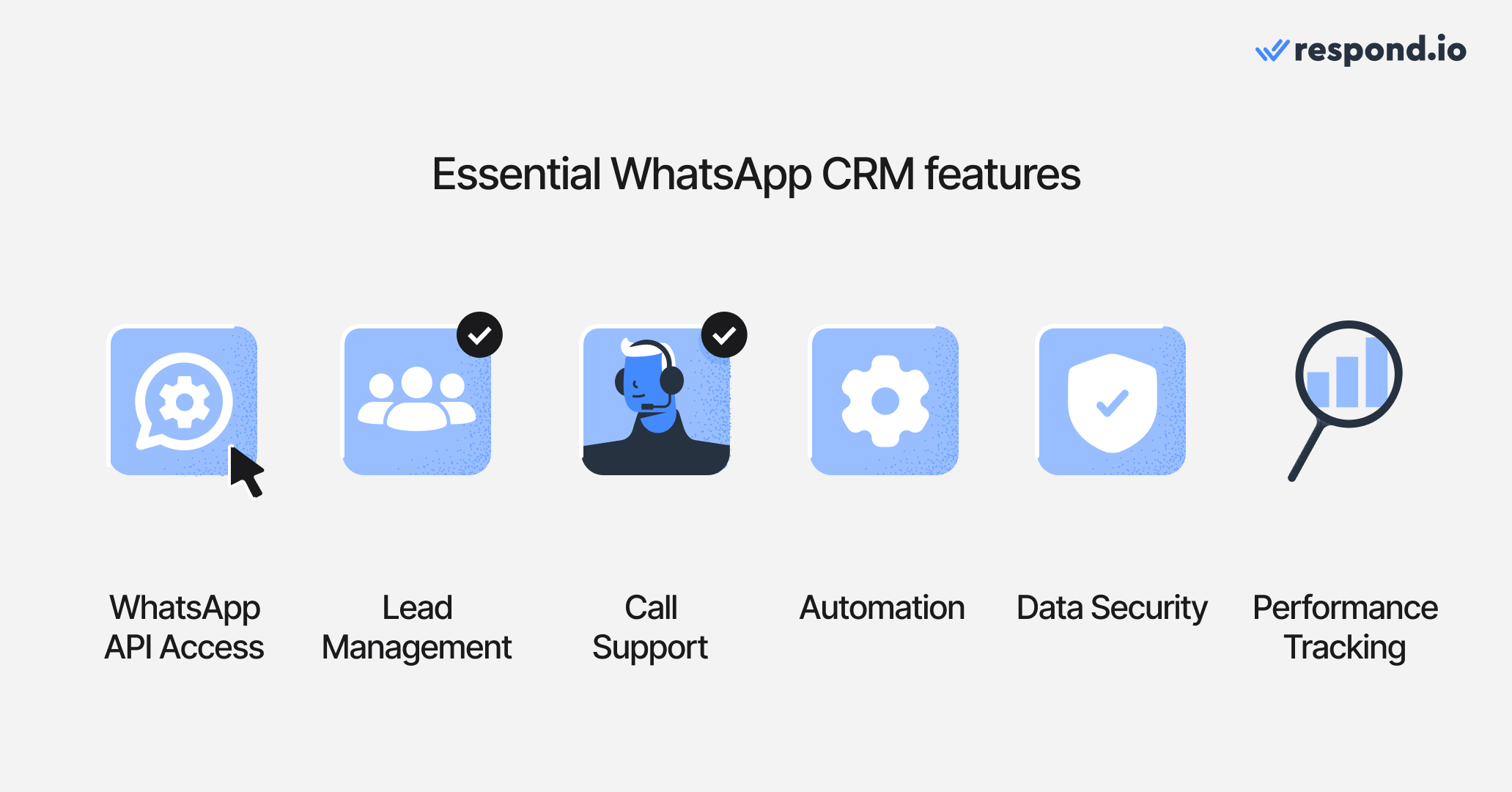
1. Accesso API WhatsApp
Il CRM dovrebbe offrire un accesso all'API WhatsApp senza attriti, per collegare WhatsApp facilmente. Usare un WhatsApp Business Solution Provider (BSP) ufficiale garantisce una configurazione più rapida e sicura.
Ad esempio, Salesforce e Respond.io sono BSP ufficiali che forniscono direttamente l'accesso all'API WhatsApp agli utenti. Al contrario, HubSpot offre un'integrazione nativa con WhatsApp, ma richiede agli utenti di collegare i propri account WhatsApp Business esistenti, anziché agire come BSP.
2. Integrazione e gestione dei lead
La soluzione ideale dovrebbe integrarsi con piattaforme e-commerce, strumenti aziendali e altri canali di messaggistica per centralizzare i dati dei clienti. Oltre a sincronizzare contatti e conversazioni, dovrebbe tracciare il progresso del cliente e aiutare le aziende a gestire i lead in modo efficiente.
Ad esempio, la funzione Ciclo di vita di respond.io consente ai team di organizzare i contatti in diverse fasi del processo di vendita, rendendo più semplice personalizzare la comunicazione e convertire i lead in clienti. Questo diventa molto più semplice una volta che configuri il tuo agente IA per aggiornare automaticamente lo stato del ciclo di vita e i campi di contatto. Ne parleremo più avanti.
3. Supporto per le chiamate WhatsApp
Per interazioni ad alto valore, richieste complesse e supporto urgente, la comunicazione vocale è fondamentale. Respond.io supporta le chiamate WhatsApp Business, così i team possono gestire le chiamate direttamente dalla piattaforma, offrendo ai clienti un'alternativa senza cambiare app.
4. Comunicazione & Automazione
Un CRM per WhatsApp dovrebbe supportare le chiamate (inclusi il trasferimento di chiamata, le chiamate con agenti IA e le trascrizioni generate automaticamente), l'automazione, i messaggi multimediali e le analisi. Funzionalità come risposte automatiche e messaggi programmati garantiscono risposte rapide e un maggiore coinvolgimento.
Se più agenti hanno bisogno di accesso, il CRM dovrebbe supportare accesso multi-utente per WhatsApp Business. Questo permette ai team di sincronizzare i contatti, accedere alle conversazioni da dispositivi diversi e collaborare in modo efficiente.
Inoltre, su respond.io l'automazione va oltre regole e flussi di lavoro. Agenti AI operano sia nelle chat che nelle chiamate, incluse le interazioni vocali 24/7 tramite Agenti AI vocali. They can nudge unresponsive customers, collect details, qualify leads, add tags and hand off conversations to human agents with internal comments, while call outcomes and CRM context are logged in the same workspace. Questo offre ai team assistenza AI pratica e collaborativa, senza aumentare l'organico.
5. Sicurezza dei dati e conformità
WhatsApp è intrinsecamente sicuro grazie alla crittografia end-to-end. Tuttavia, poiché gestisce le conversazioni con i clienti, la soluzione che scegli dovrebbe anche rispettare le normative sulla protezione dei dati e proteggere i dati dei clienti.
6. Analisi e monitoraggio delle prestazioni
Un CRM WhatsApp dovrebbe includere strumenti di reportistica per monitorare metriche importanti. Le aziende possono analizzare le fonti di acquisizione clienti, i tempi di risposta e i livelli di coinvolgimento per ottimizzare le strategie di messaggistica e migliorare le conversioni.
Poiché non tutte le soluzioni offrono queste funzionalità, le aziende dovrebbero cercarne una che lo faccia. È qui che entra in gioco Respond.io, che riunisce tutto e offre un modo affidabile per integrare WhatsApp con il tuo CRM.
Trasforma le conversazioni in clienti con l'API WhatsApp ufficiale di respond.io ✨
Gestisci chat e chiamate WhatsApp in un unico posto!
Come integrare l'API WhatsApp con il tuo CRM usando Respond.io in 3 passaggi
Passiamo alla parte più interessante. Integrare WhatsApp con il tuo CRM potrebbe sembrare tecnico, ma si può ridurre a pochi passaggi chiari. Ecco una semplice roadmap.
Passo 1: Crea un account WhatsApp Business API su Respond.io
Prima di tutto, avrai bisogno di accesso all'API WhatsApp Business. Questo perché non puoi integrare l'app standard WhatsApp Business con un CRM.
In quanto WhatsApp Business Solution Provider ufficiale, Respond.io consente alle aziende di configurare rapidamente e in sicurezza la propria API. Scopri come creare un account API WhatsApp Business con Respond.io.
Passo 2: Collega WhatsApp al tuo CRM
Con le capacità di integrazione native di respond.io, le aziende possono collegare WhatsApp al loro CRM usando diversi metodi:
Integrazione nativa: Integra direttamente CRM come HubSpot e Salesforce con respond.io per sincronizzare contatti, messaggi e workflow.
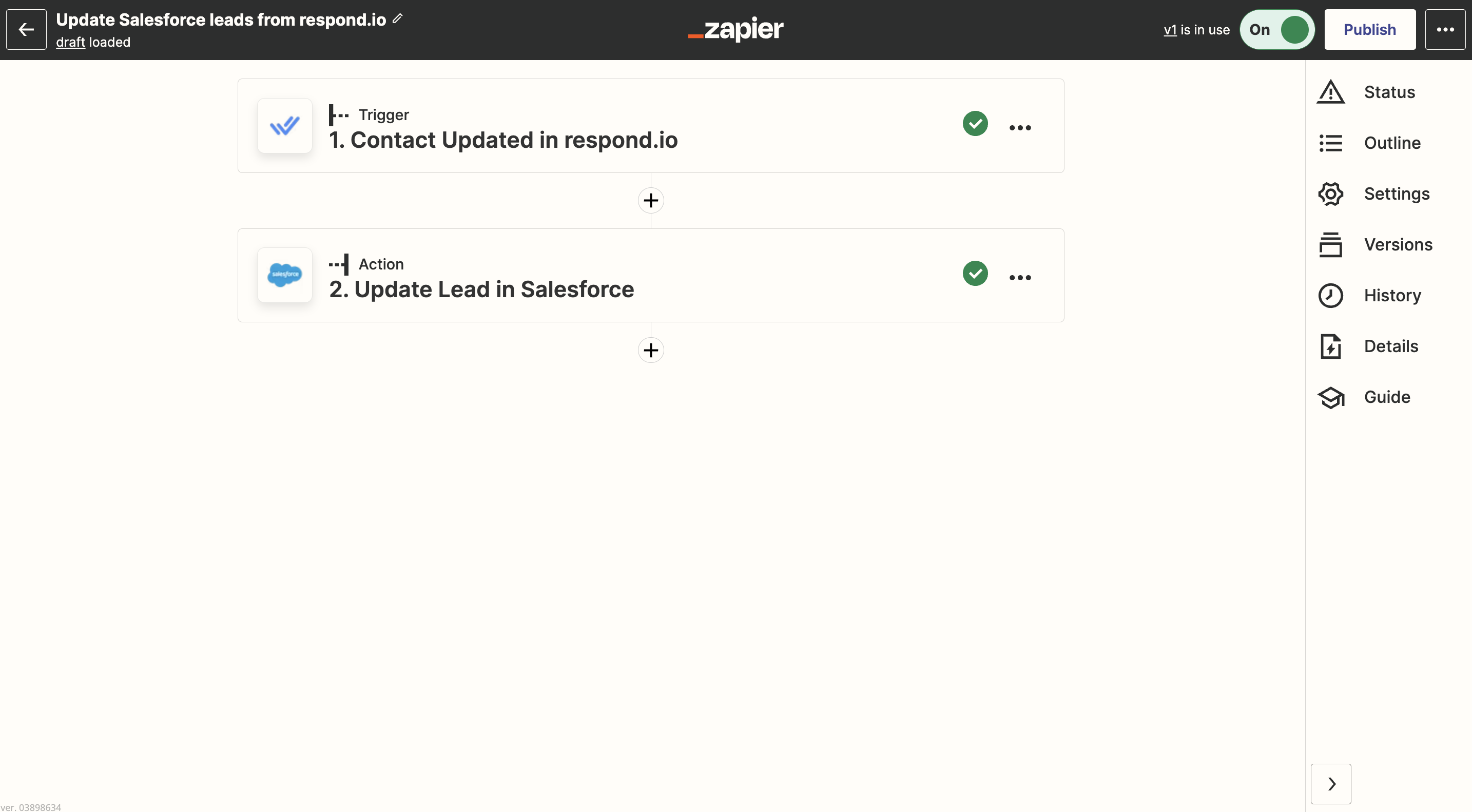
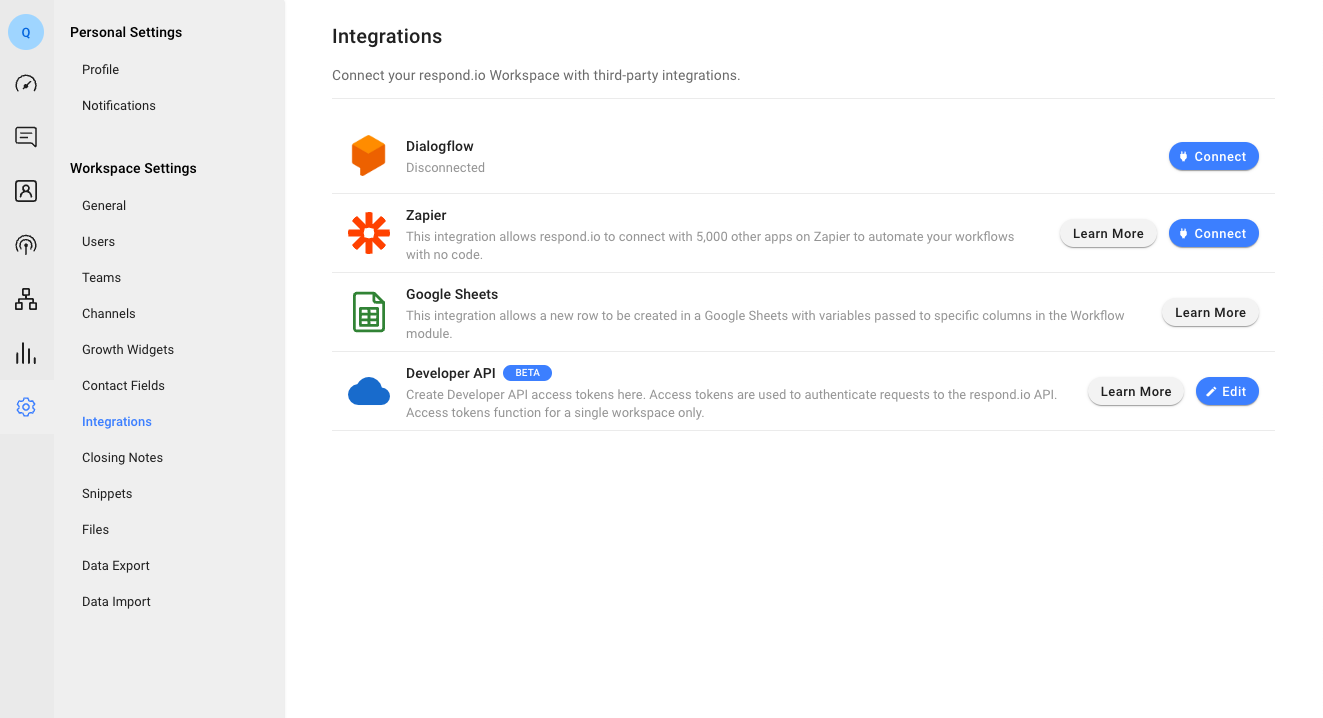
Integrazione API personalizzata: Crea un nuovo Workflow e aggiungi il Passo Richiesta HTTP per integrare qualsiasi CRM con respond.io.

Passo 3: Imposta le informazioni da sincronizzare
Una volta collegato, assicurati che la sincronizzazione dei dati funzioni correttamente tra WhatsApp e il tuo CRM. Respond.io consente alle aziende di sincronizzare contatti, cronologia delle conversazioni e fasi del ciclo di vita, automatizzando l'assegnazione dei lead, l'instradamento delle chat e i follow-up.
Questo assicura che le conversazioni WhatsApp siano gestite in modo efficiente senza passare tra piattaforme.
Migliori pratiche per ottenere il massimo dal tuo CRM WhatsApp
Configurare l'integrazione è solo l'inizio. Per ottenere il massimo dal tuo CRM WhatsApp, tieni sempre presenti queste best practice.
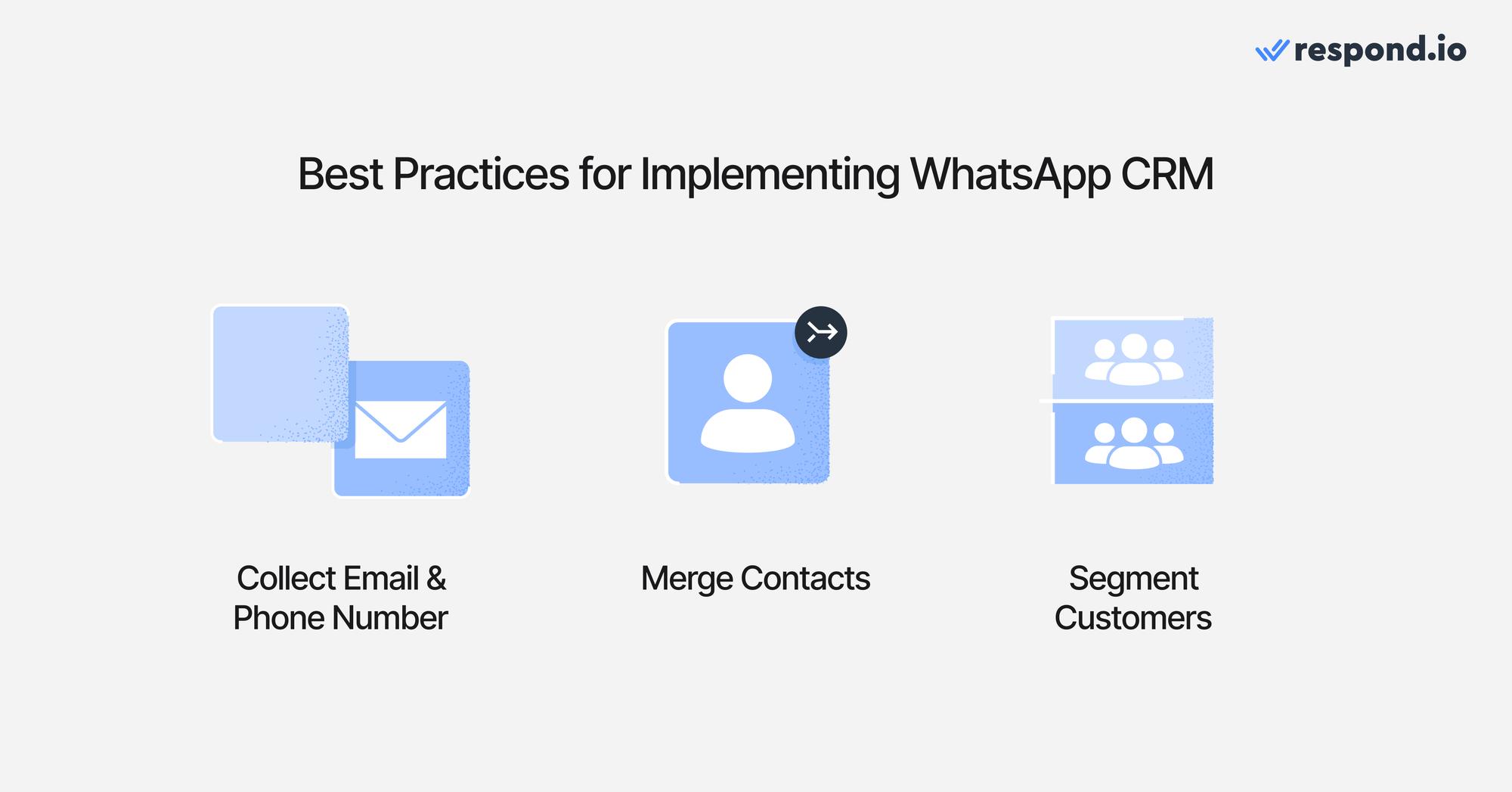
1. Raccogli Email e Numeri di Telefono
Per la maggior parte dei CRM, ogni lead o cliente deve avere un identificatore unico, come indirizzo email o numero di telefono. Fortunatamente, quando un lead ti contatta su WhatsApp, ottieni automaticamente il suo numero di telefono.
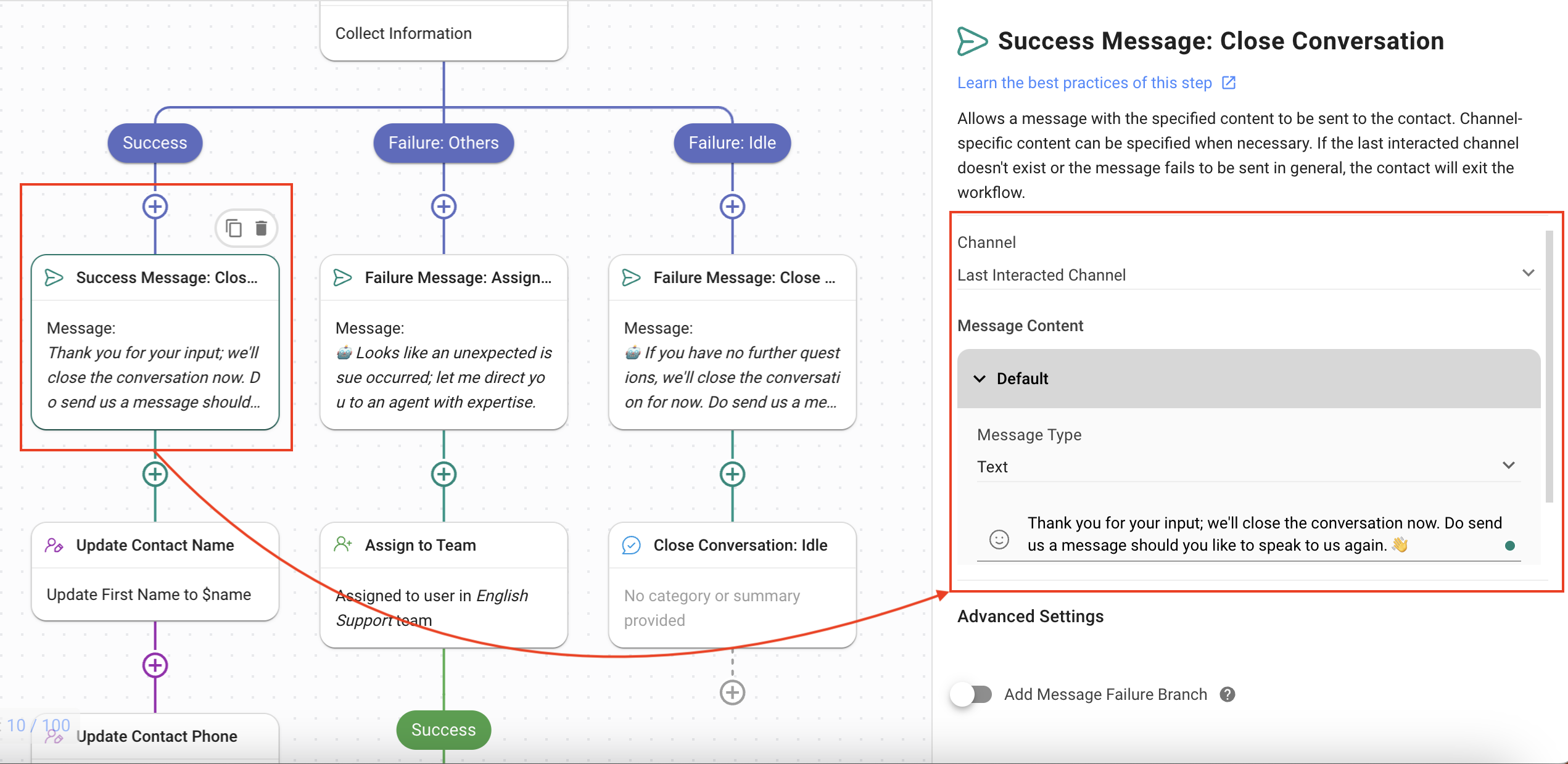
Se hai bisogno anche dell'indirizzo email, configura un'automazione per richiederlo. Quindi, sincronizza questi dettagli importanti nella tua rubrica di contatti respond.io e nel tuo CRM.
2. Unisci i contatti per evitare duplicati
Spesso un lead potrebbe contattarti tramite un canale diverso da WhatsApp, come Messenger o email, e vorrai identificarlo rapidamente.
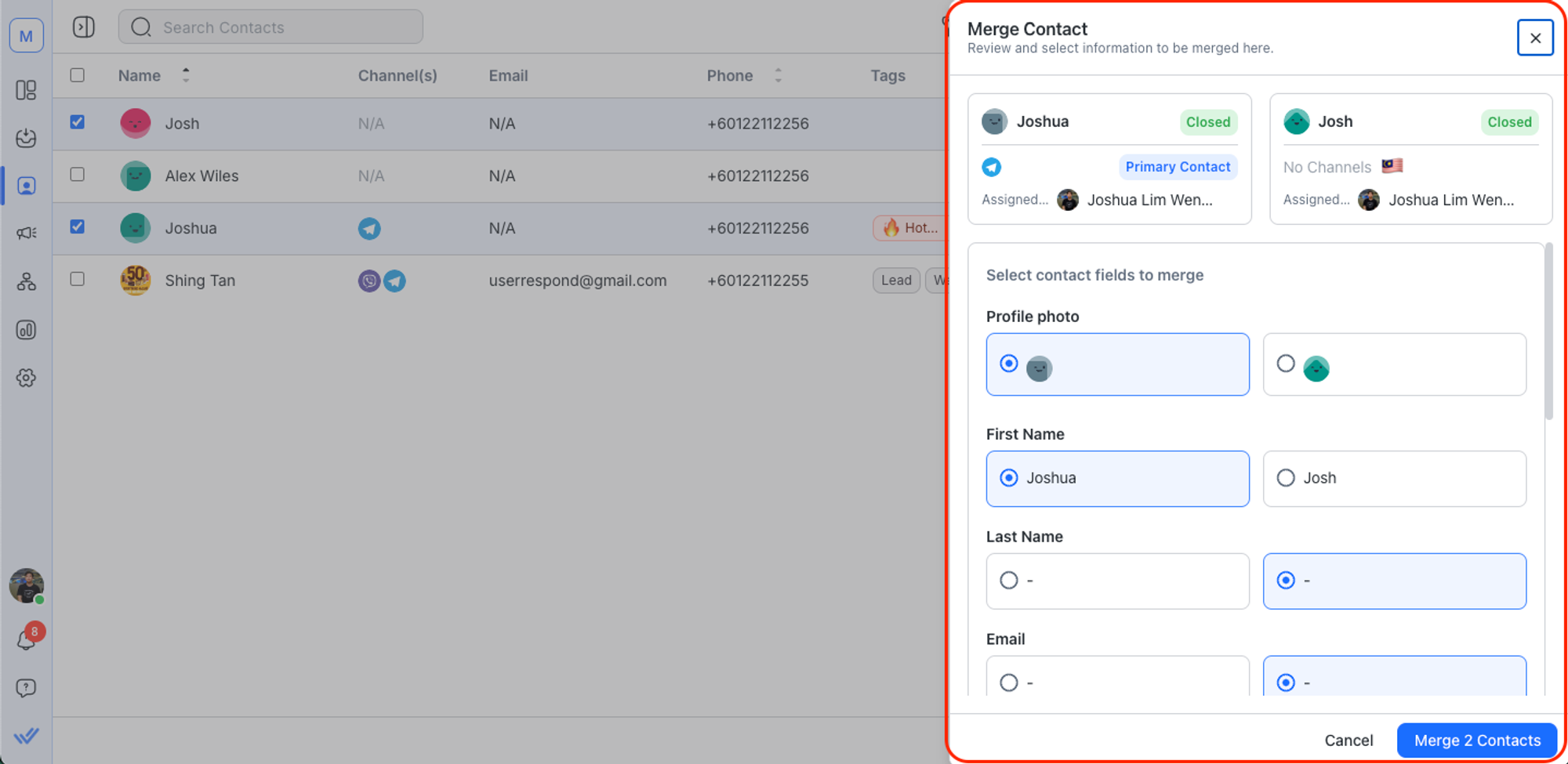
Ad esempio, Respond.io riconosce automaticamente i duplicati se ricevi contatti con la stessa email o numero di telefono e ti verrà chiesto di unire. Quando ti integri con un CRM, puoi riflettere questi aggiornamenti anche nel CRM.
3. Segmenta i clienti per le trasmissioni WhatsApp
Inviare informazioni dal tuo CRM a WhatsApp ti aiuta a identificare il pubblico target per i messaggi in massa su WhatsApp.
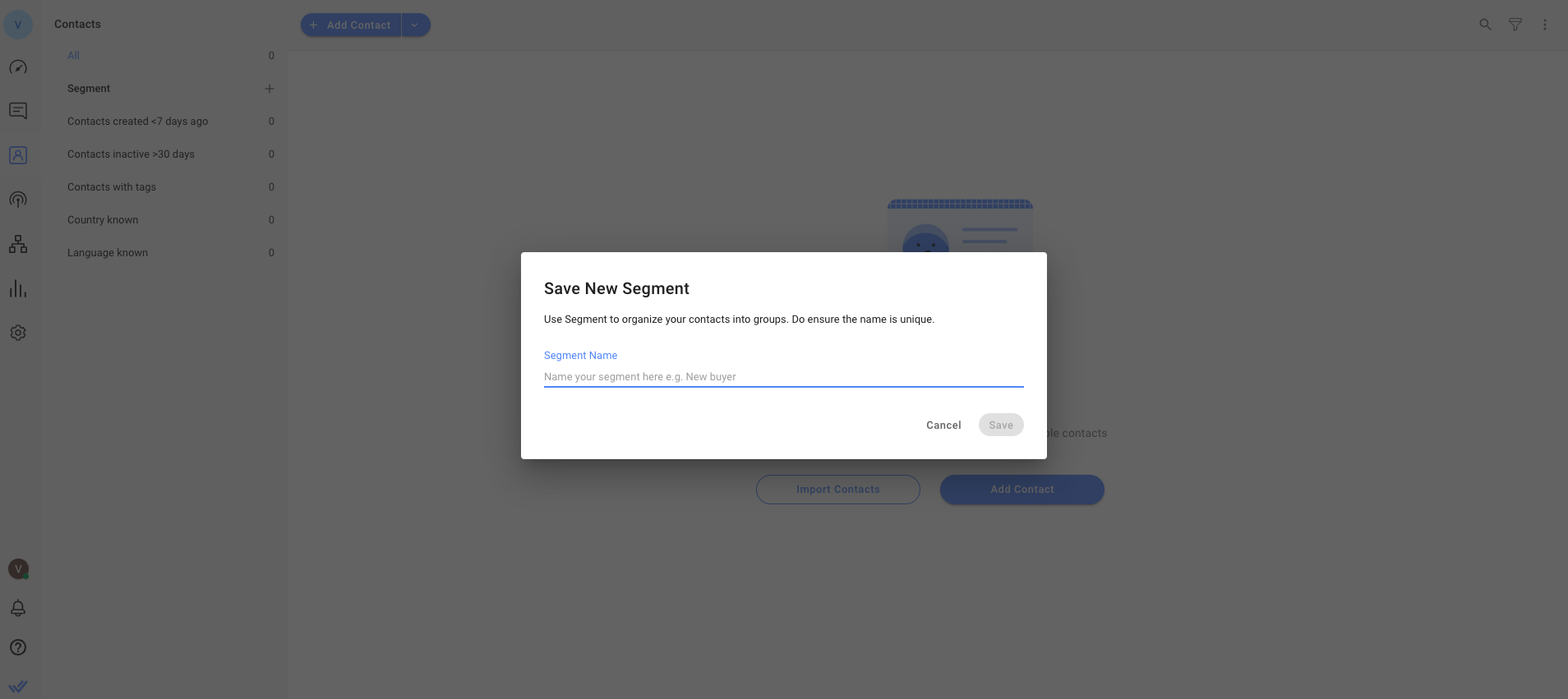
I CRM vengono spesso usati per segmentare il pubblico per le email, ma integrando WhatsApp puoi ottenere dettagli di segmentazione preziosi per raggruppare i contatti per le trasmissioni.
Sfide e soluzioni nell'utilizzo del CRM WhatsApp
Anche con i vantaggi del CRM WhatsApp e una solida comprensione delle best practice, ci sono ancora insidie da considerare. Dopotutto, conoscere il funzionamento non significa automaticamente padroneggiarlo.
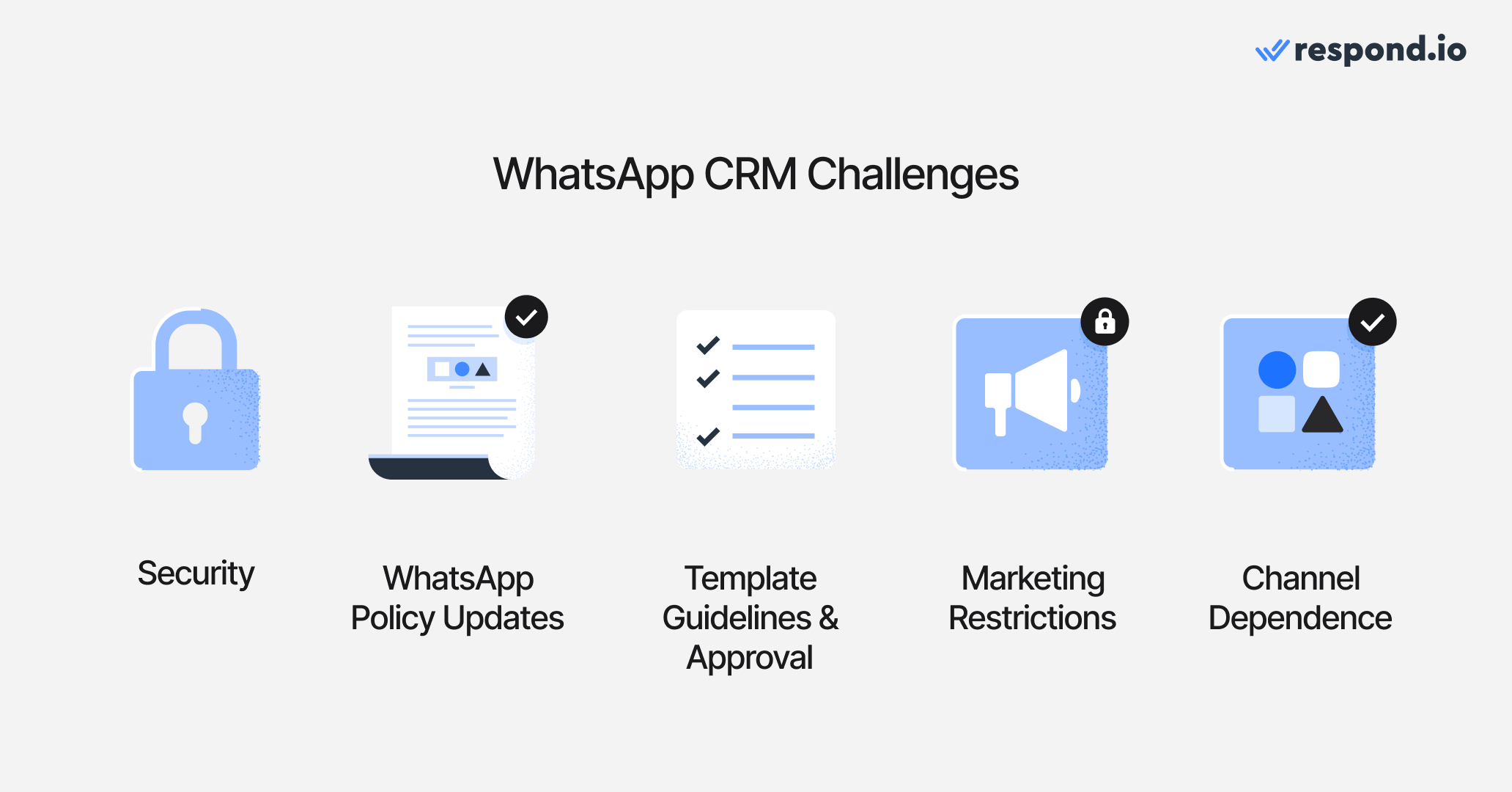
Ecco alcune sfide che potresti incontrare.
1. Privacy e sicurezza dei dati
Integrare WhatsApp con un CRM significa spostare i dati dei clienti tra i sistemi, il che può introdurre rischi per la sicurezza.
Per questo motivo, scegliere una piattaforma che rispetti standard di sicurezza rigorosi è fondamentale. Le aziende dovrebbero anche ridurre al minimo l'errore umano abilitando 2FA o SSO e usando funzioni come il mascheramento di email e numeri di telefono per proteggere le informazioni dei clienti.
2. Rimanere aggiornati sulle politiche e le funzionalità di WhatsApp
WhatsApp aggiorna frequentemente le sue politiche, i prezzi e le funzionalità, il che può influenzare il modo in cui usi la piattaforma. Non restare aggiornato potrebbe causare restrizioni o interruzioni impreviste nella comunicazione.
Dovresti controllare regolarmente gli annunci ufficiali di WhatsApp per evitare problemi di conformità o interruzioni del servizio, oppure collaborare con un fornitore di soluzioni WhatsApp Business affidabile come Respond.io per rimanere allineato ai requisiti più recenti.
3. Limitazioni dei modelli di messaggio e processo di approvazione
Le aziende che usano l'API WhatsApp devono usare modelli pre-approvati per inviare messaggi in uscita. WhatsApp ha linee guida severe su cosa può essere incluso, spesso respingendo modelli troppo promozionali o poco chiari. In genere, devono essere:
Non promozionali
Pre-approvati da WhatsApp
Chiari e informativi
Inoltre, il processo di approvazione può richiedere tempo, ritardando le campagne. Per evitare interruzioni, dovresti creare modelli chiari conformi alle politiche e inviarli in anticipo.
4. Restrizioni al marketing e alle trasmissioni
Alcune aziende desiderano integrare WhatsApp con un CRM per poter importare tutti i contatti del CRM in WhatsApp e inviare loro messaggi promozionali.
Tuttavia, ciò rischia di causare un blocco su WhatsApp, poiché la piattaforma proibisce i messaggi non richiesti. Consigliamo di portare più contatti su WhatsApp usando link WhatsApp, codici QR e annunci click-to-chat, assicurandoti che si iscrivano.
5. Dipendenza dal canale
Affidarsi solo a WhatsApp per la comunicazione con i clienti è rischioso. Se WhatsApp dovesse smettere di funzionare o una parte dei clienti non lo utilizzasse, la tua azienda potrebbe trovarsi in difficoltà
Una strategia multicanale garantisce che le aziende possano coinvolgere i clienti su piattaforme diverse. Usare un CRM o un software di messaggistica con capacità multicanale permette alle aziende di gestire conversazioni da WhatsApp, Messenger, email e altro in un unico posto.
Integrare WhatsApp con il tuo CRM: perché Respond.io è la scelta migliore?
Respond.io è una piattaforma per la gestione delle conversazioni con i clienti alimentata dall'IA, un WhatsApp Business Solution Provider ufficiale e un Meta Business Partner che collega WhatsApp a più CRM. Rende semplice sincronizzare le conversazioni, automatizzare i flussi di lavoro e gestire le interazioni con i clienti da un unico posto. Con affidabilità della piattaforma e supporto clienti dedicato, le aziende possono garantire operazioni fluide e messaggistica senza interruzioni.
Vediamo come le aziende usano respond.io per marketing, vendite, assistenza clienti, collaborazione di team e monitoraggio delle prestazioni per capire perché sia la soluzione migliore.
Marketing: catturare e coinvolgere i lead
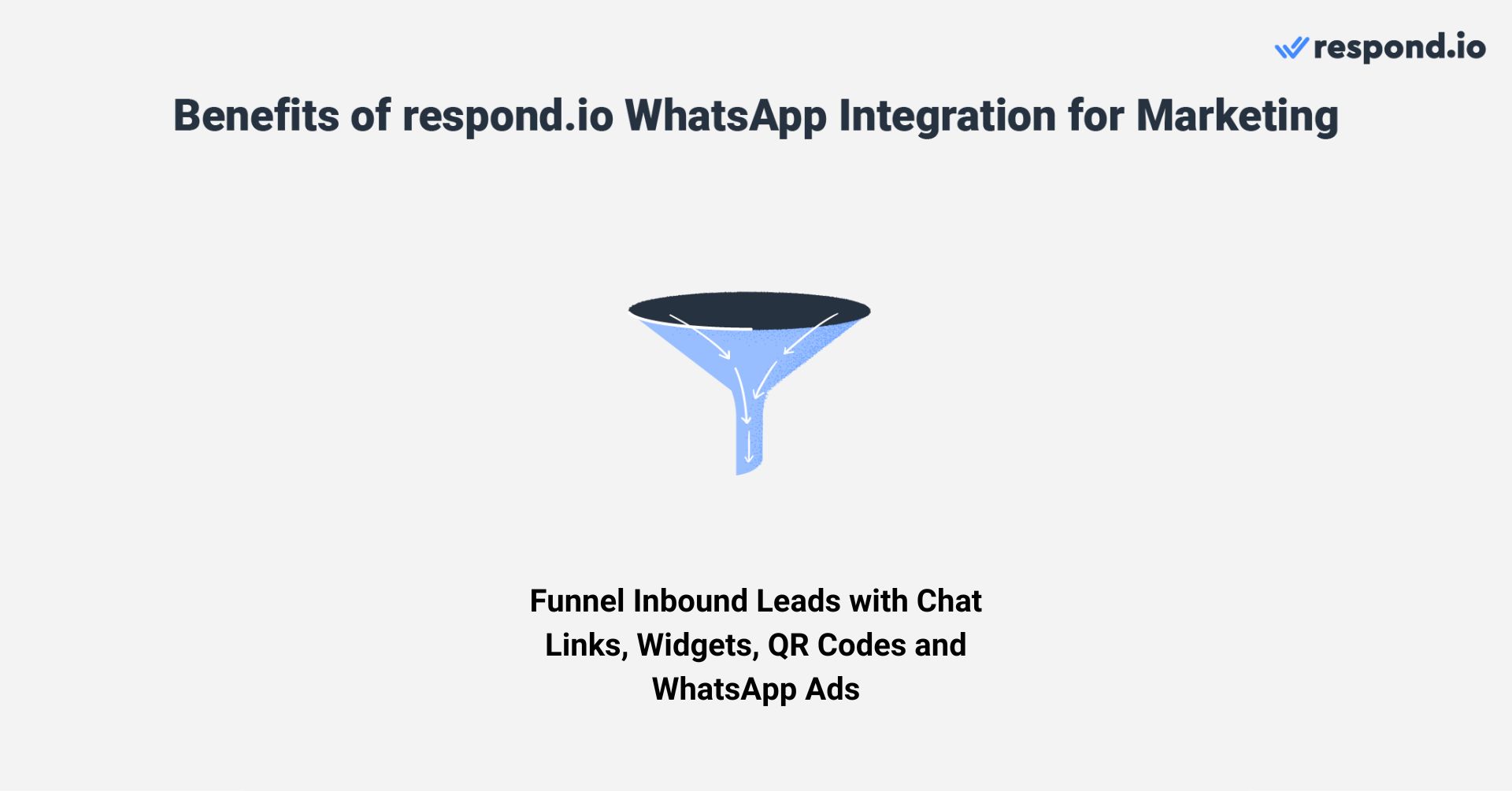
Le aziende possono attrarre lead WhatsApp usando codici QR su materiale fisico, link di chat nei contenuti digitali o widget chat sui siti web. Per una generazione proattiva di lead, gli annunci click-to-WhatsApp su Facebook e Instagram aiutano le aziende a raggiungere pubblici mirati e guidarli verso la conversione.
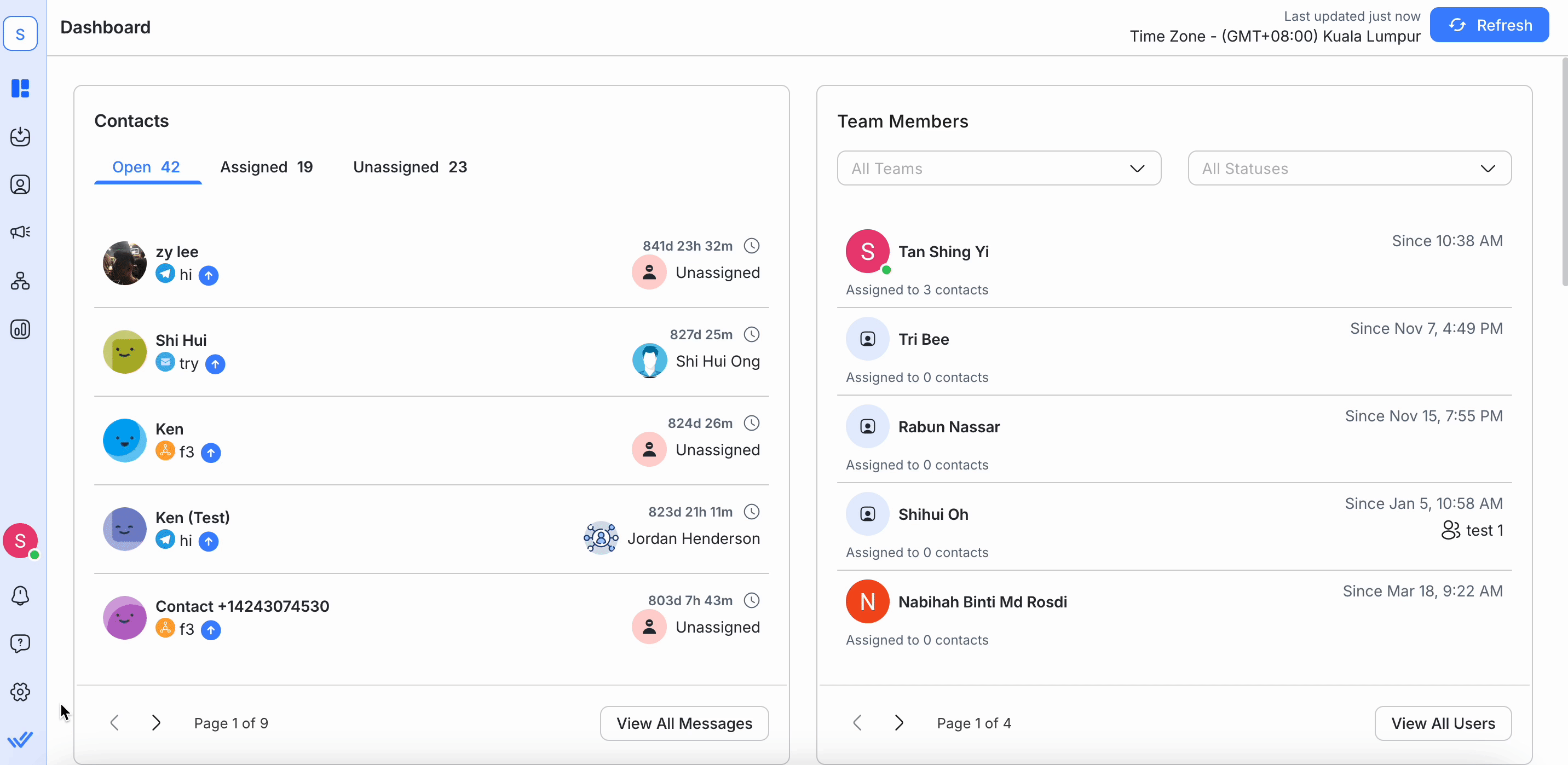
Quando un lead ti contatta, respond.io raccoglie e sincronizza automaticamente i dettagli di contatto nel CRM, permettendo alle aziende di segmentare i clienti, inviare trasmissioni e personalizzare i follow-up con strumenti come cataloghi WhatsApp, messaggi interattivi e notifiche push.
Vendite: automatizzare la qualificazione dei lead e le attività di vendita
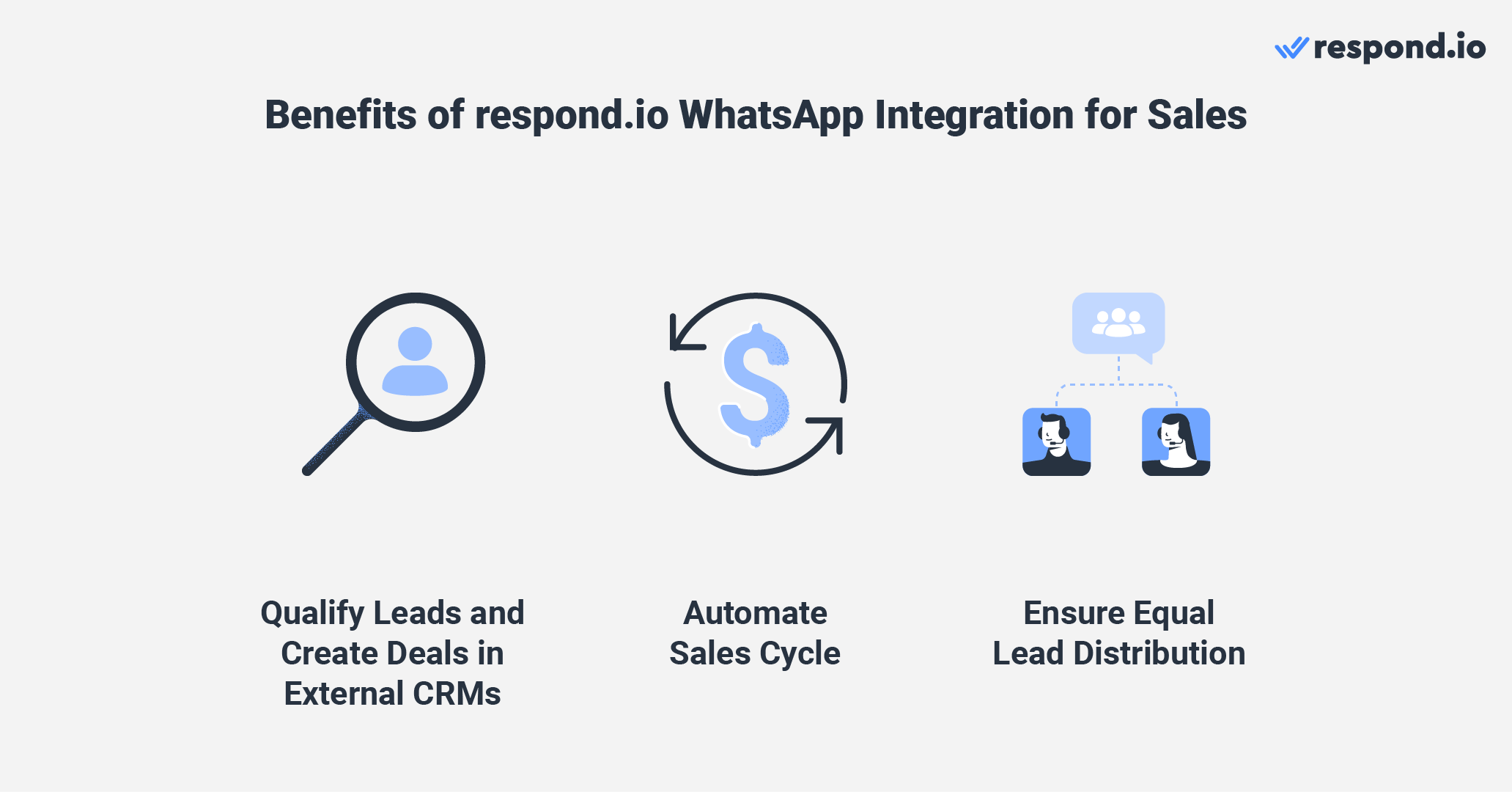
Respond.io si integra nativamente con CRM come HubSpot e Salesforce, permettendo ai team di vendita di qualificare i lead, tracciare le conversazioni e chiudere affari — tutto da un'unica piattaforma. Con l'automazione basata su IA, le aziende possono filtrare i lead a bassa priorità automatizzando le domande di qualificazione e il lead scoring.
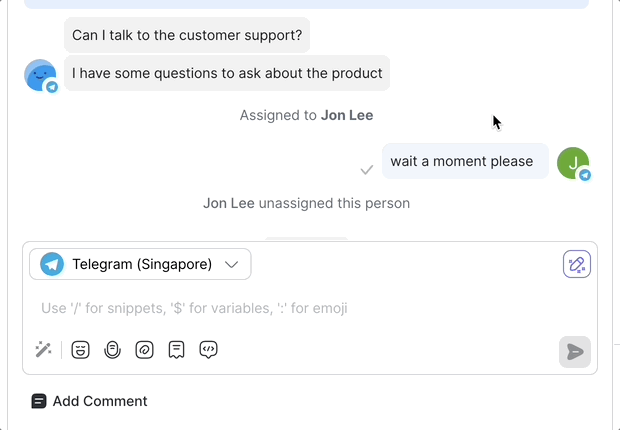
Molti team migliorano questa configurazione con un Agente IA di respond.io, che può gestire automaticamente le richieste iniziali, consigliare prodotti e inviare link per pagamenti o prenotazioni.
Una volta verificato un lead, respond.io può instradare le conversazioni all'agente di vendita giusto in base alla priorità, alla dimensione dell'affare o alla regione. Risposte assistite dall'IA, messaggi ricchi multimediali e il supporto per le chiamate WhatsApp permettono un ingaggio e conversioni più rapidi.
Retention: migliorare la qualità e l'efficienza dell'assistenza clienti
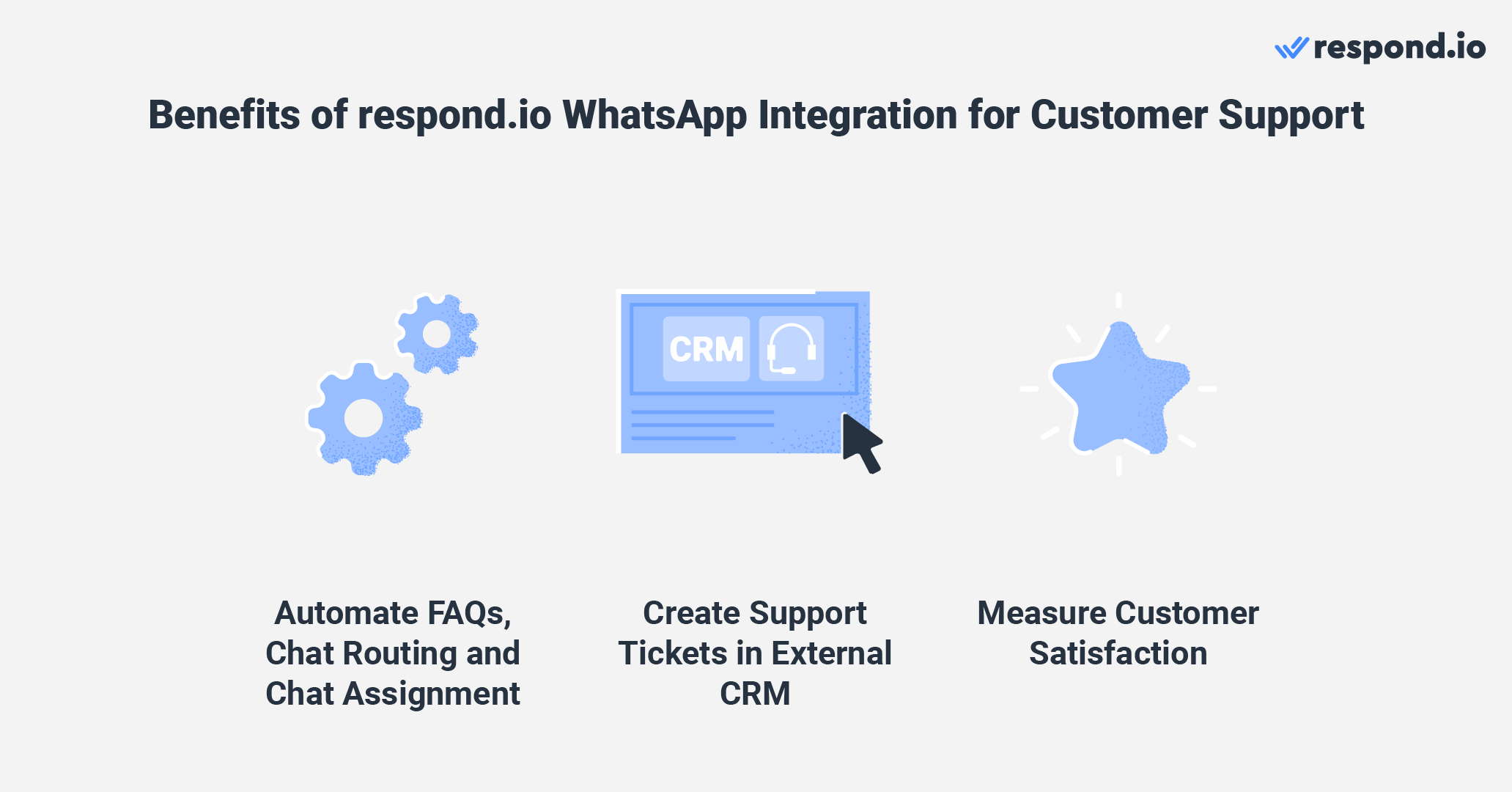
Le aziende possono automatizzare le FAQ e guidare i clienti attraverso opzioni di self-service usando domande a scelta multipla. Per richieste complesse, la piattaforma può automaticamente instradare i clienti al team giusto.

AI Assist fornisce agli agenti accesso rapido alle knowledge base, migliorando i tempi di risposta e l'accuratezza. Quando necessario, gli agenti possono facilmente passare a conversazioni vocali usando l'API per le chiamate WhatsApp Business, abilitando la comunicazione diretta nella stessa piattaforma. Le aziende possono anche inviare sondaggi CSAT dopo la conversazione per misurare la soddisfazione del cliente.
Collaborazione del team: migliorare la comunicazione interna
Respond.io facilita la collaborazione tra i membri del team in una casella di posta condivisa. Attraverso commenti interni, gli agenti possono fornire informazioni di contesto su un contatto per i follow-up.
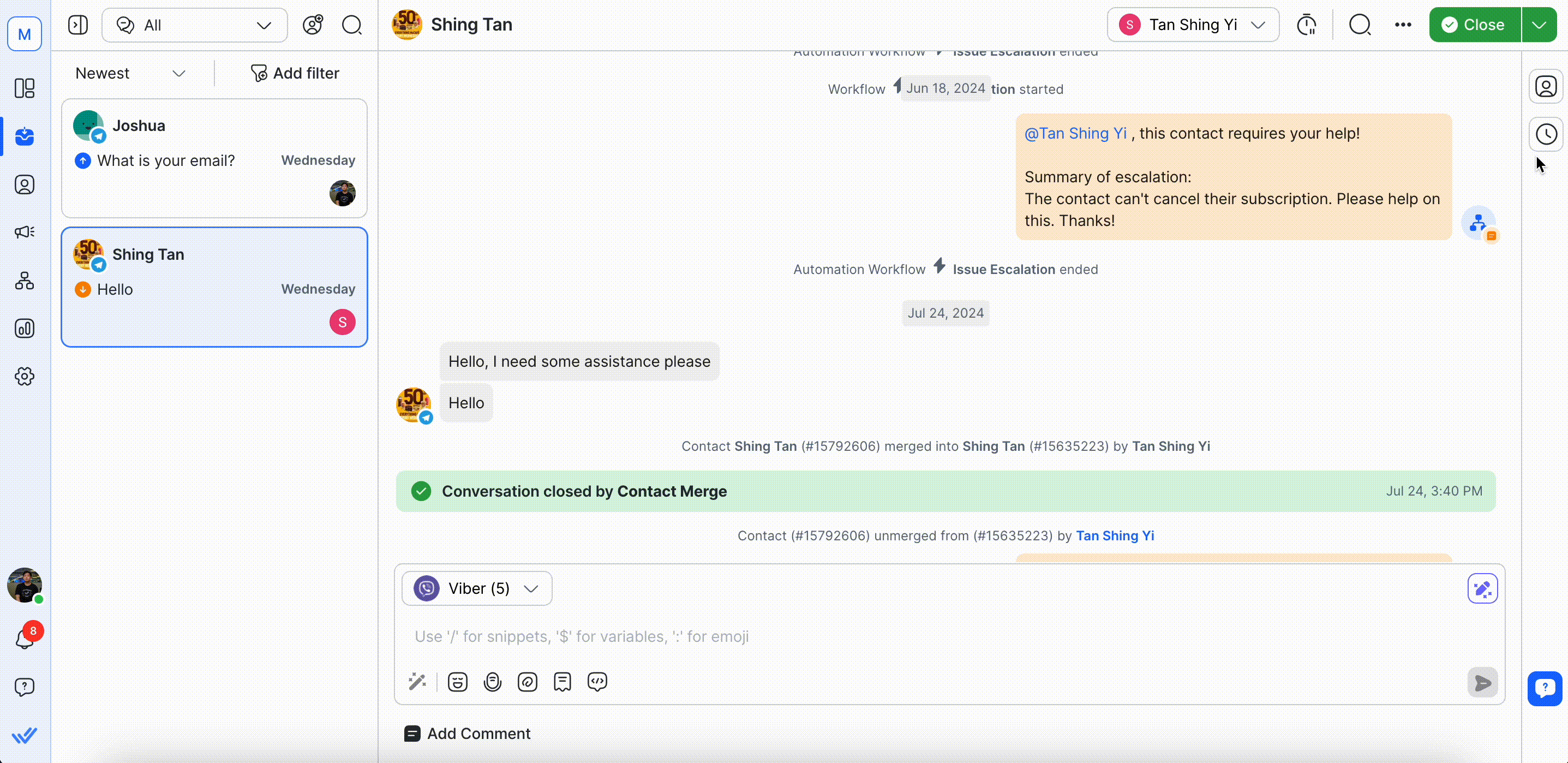
Gli agenti possono anche taggare i colleghi per discutere il modo migliore per aiutare un cliente o escalare casi complessi quando necessario. Il bello è che gli agenti possono collaborare facilmente, chattare con i clienti e gestire i loro compiti ovunque con l'app mobile respond.io.
Monitoraggio delle prestazioni: ottenere approfondimenti per il miglioramento
I manager possono monitorare metriche in tempo reale usando il dashboard di analisi di respond.io per misurare le prestazioni degli agenti, il coinvolgimento dei clienti e i tempi di risposta.
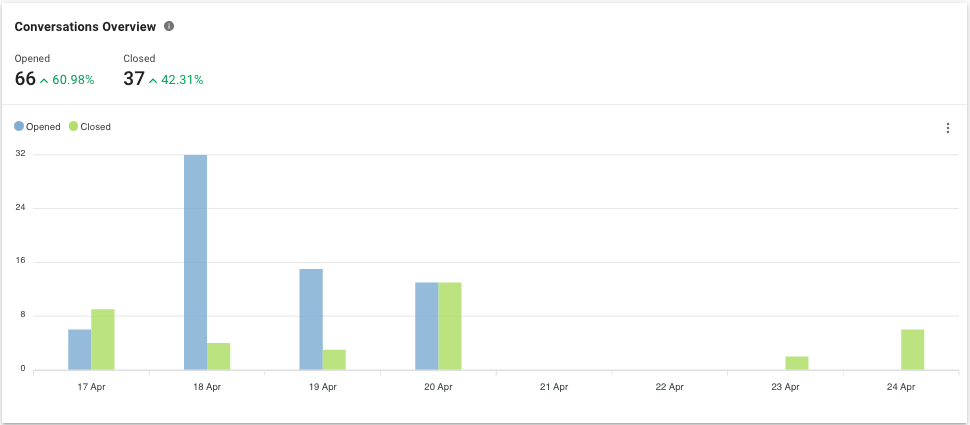
Le conversazioni di alto valore possono essere filtrate ed esaminate utilizzando un inbox personalizzata per ottimizzare le interazioni con i clienti e migliorare la qualità del servizio.
CRM WhatsApp: punti chiave
Il modo migliore per collegare WhatsApp a un CRM è usare l'API WhatsApp con una piattaforma orientata alla messaggistica come respond.io che si integra con il tuo CRM esistente. Questo permette alle aziende di gestire le conversazioni WhatsApp in modo efficace, mantenendo i dati dei clienti organizzati.
Aziende nei settori F&B, ospitalità, sanità, istruzione, immobiliare e commercio al dettaglio hanno ottenuto risultati concreti con questo approccio. Dai un'occhiata alle nostre storie dei clienti per vedere come le aziende migliorano i tempi di risposta, automatizzano i workflow e gestiscono più conversazioni senza sforzi aggiuntivi.
Ora è il momento di metterlo in pratica. Registrati per l'API WhatsApp Business di respond.io e inizia a gestire le conversazioni su WhatsApp in modo più efficace oggi!
Trasforma le conversazioni in clienti con l'API WhatsApp ufficiale di respond.io ✨
Gestisci chat e chiamate WhatsApp in un unico posto!
FAQ e risoluzione problemi
Ho bisogno dell'API WhatsApp Business per usare un CRM WhatsApp?
Sì. Per collegare WhatsApp a un CRM, la tua azienda deve usare l'API WhatsApp Business (nota anche come WhatsApp Business Platform). L'API consente l'invio e la ricezione di messaggi su larga scala in modo sicuro, accesso multi-utente e automazione.
Gli account WhatsApp regolari o l'app WhatsApp Business non supportano l'integrazione CRM perché sono limitati all'uso su un singolo dispositivo e alla messaggistica manuale. Utilizzare l'API WhatsApp ufficiale tramite un WhatsApp Business Solution Provider (BSP) come respond.io garantisce che la tua integrazione rispetti le politiche di Meta e ti permette di gestire chat, chiamate e automazioni direttamente da un'unica inbox unificata.
L'API WhatsApp Business è gratuita?
No. L'API WhatsApp Business non è gratuita. Le aziende tipicamente pagano per tre componenti principali:
Un numero di telefono dedicato connesso all'API WhatsApp Business.
Un inbox di messaggistica o piattaforma (come respond.io) che abilita la gestione dei messaggi, l'automazione e la sincronizzazione con i CRM.
Tariffe per messaggio stabilite da WhatsApp, che variano in base alla categoria del messaggio (marketing, utility, autenticazione o servizio) e al paese. Sebbene i costi possano aumentare con il volume, l'API è molto più scalabile e ricca di funzionalità rispetto all'app WhatsApp Business gratuita, rendendola adatta alle aziende che gestiscono grandi basi clienti o usano automazione e IA.
Qual è il miglior CRM con integrazione WhatsApp?
La migliore soluzione CRM WhatsApp dipende dal flusso di lavoro della tua azienda e dal livello di automazione di cui hai bisogno. I CRM tradizionali come Salesforce o HubSpot offrono integrazioni WhatsApp di base ma spesso mancano di supporto completo per messaggi e chiamate.
Per la maggior parte delle aziende, la migliore opzione è utilizzare una piattaforma di gestione delle conversazioni come respond.io, che funge da CRM per WhatsApp. Respond.io connette WhatsApp con più CRM, automatizza la qualificazione dei lead, supporta risposte assistite da IA e chiamate WhatsApp e centralizza tutti i dati dei clienti in un'unica inbox. Questa configurazione offre un'esperienza CRM WhatsApp completa senza le solite limitazioni d'integrazione.
CRM WhatsApp vs sistemi CRM tradizionali: qual è la differenza?
Sia i CRM WhatsApp che i sistemi CRM tradizionali ti aiutano a gestire i dati dei contatti, tracciare le conversazioni e supportare le operazioni di vendita e assistenza. La principale differenza sta nei canali di comunicazione. I CRM tradizionali sono stati progettati per flussi di lavoro basati su email e telefono, offrendo supporto limitato per la messaggistica istantanea.
Un CRM WhatsApp si concentra sulla messaggistica conversazionale in tempo reale tramite l'API WhatsApp, permettendo automazione, instradamento delle chat e assistenza IA. Piattaforme come respond.io collegano questi due mondi connettendo WhatsApp direttamente al tuo CRM in modo che tutti i dati delle chat, gli aggiornamenti dei contatti e le attività rimangano sincronizzati.
L'app WhatsApp Business è la stessa cosa dell'API WhatsApp?
No. WhatsApp Business App e WhatsApp Business API sono due prodotti diversi. L'app è pensata per piccole imprese che gestiscono manualmente poche conversazioni su un solo telefono. Offre funzionalità di automazione limitate come risposte rapide e messaggi di assenza.
L'API WhatsApp Business, invece, è pensata per aziende medio-grandi che necessitano di automazione, accesso multi-agente, integrazione CRM e modelli di messaggio per il contatto con i clienti. Piattaforme come respond.io aiutano le aziende a ottenere accesso ufficiale all'API e collegare WhatsApp ad altri strumenti per gestire chat, chiamate e automazioni su scala.
Quanto è sicuro un CRM WhatsApp?
La sicurezza dipende sia dall'infrastruttura di WhatsApp sia dalla piattaforma CRM che usi. L'API WhatsApp Business fornisce crittografia end-to-end tra la tua azienda e i clienti, garantendo la privacy dei messaggi. Tuttavia, i dati archiviati nel CRM devono essere protetti con crittografia robusta, controlli di accesso e misure di conformità.
Le aziende dovrebbero scegliere fornitori che rispettano standard globali come GDPR e ISO 27001, come respond.io, che offre accesso basato sui ruoli, archiviazione cloud sicura e registri di audit. Questa combinazione garantisce che l'integrazione del tuo CRM WhatsApp rimanga sicura, conforme e pronta per l'azienda.
Posso integrare WhatsApp con più CRM?
Sì. Puoi integrare WhatsApp con più CRM, ma solo se usi una piattaforma che supporta la connettività multi-CRM. L'API WhatsApp Business si collega a un provider di messaggistica alla volta, quindi ti serve un sistema intermedio come respond.io per sincronizzare i dati tra più CRM.
Respond.io funge da hub centrale per le conversazioni WhatsApp e può inviare dettagli di contatto, messaggi e aggiornamenti del Lifecycle a sistemi esterni come Salesforce, HubSpot o Pipedrive contemporaneamente. Questa configurazione permette a diversi team di usare il CRM preferito mantenendo una vista unificata di tutte le interazioni WhatsApp, garantendo coerenza ed evitando record duplicati.
Posso effettuare chiamate WhatsApp all'interno del mio CRM?
I CRM nativi come HubSpot o Salesforce solitamente non supportano direttamente le chiamate WhatsApp poiché si concentrano sulla messaggistica testuale o sul tracciamento dei ticket.
Tuttavia, con respond.io le aziende possono avviare e ricevere chiamate WhatsApp Business direttamente dalla stessa piattaforma in cui sono gestiti chat e dati clienti. Gli agenti vedono dettagli di contatto, messaggi precedenti e cronologia delle chiamate in un unico posto, permettendo un supporto più fluido e rapido. Poiché la funzione di chiamata si basa sull'API ufficiale WhatsApp Business Calling di Meta, garantisce connessioni vocali sicure e di alta qualità senza cambiare strumenti.
Gli Agenti IA possono rispondere alle chiamate aziendali?
Sì, gli Agenti AI possono rispondere alle chiamate vocali se usi lo strumento giusto. Su respond.io, puoi configurare la voce dell'Agente IA, aggiungere istruzioni e testare l'esperienza prima di andare live. Questo ti dà pieno controllo su come vengono gestite le chiamate. A differenza dei voice bot autonomi, l'Agente Vocale IA di respond.io è completamente integrato in una casella unificata, permettendo alle aziende di gestire messaggi e interazioni vocali in un unico thread per ogni cliente, con log e report condivisi.
Come posso usare gli Agenti IA per seguire le conversazioni con i clienti?
Se le conversazioni restano in sospeso in attesa di una risposta del cliente, puoi impostare il tuo Agente IA per sollecitarli con una domanda di follow-up pertinente. Ad esempio, l'Agente IA di respond.io va oltre i semplici solleciti basati sul tempo o i trigger del workflow. Utilizza la cronologia delle conversazioni per comprendere il contesto e decide quando e come effettuare il follow-up. Questa comprensione aiuta a evitare di contattare clienti i cui problemi sono già stati risolti e a inviare solleciti personalizzati e simili a quelli umani al momento giusto.
Posso ottenere trascrizioni delle chiamate telefoniche con i clienti?
Sì. Con respond.io, le chiamate VoIP e quelle della WhatsApp Business API possono essere trascritte automaticamente in registri chiari e ricercabili. Ogni trascrizione include i nomi dei parlanti, i timestamp e il testo completo, così i manager possono rivedere rapidamente le conversazioni senza ascoltare l'intera registrazione. Questa funzionalità è disponibile solo su piani specifici.
Queste trascrizioni facilitano l'audit delle performance degli agenti, l'individuazione di opportunità di coaching e la formazione del nuovo personale con esempi reali tratti da chiamate effettive. Sono inoltre utili per conformità e responsabilità, poiché tutte le trascrizioni sono archiviate in modo sicuro sulla piattaforma e possono essere accessibili tramite il Contact Drawer o il Reports Module. Questo offre ai manager piena visibilità tra i team e supporta un controllo qualità coerente basato sui dati.
Come posso trasferire le chiamate ai clienti a un altro agente?
Per trasferire una chiamata, hai bisogno di una piattaforma di comunicazione aziendale o gestione delle chiamate che supporti l'inoltro delle chiamate. Con essa, puoi spostare una conversazione in corso a un altro agente o numero senza disconnettere il cliente. Su respond.io puoi trasferire chiamate sull'API WhatsApp Business Calling e altri canali VoIP verso colleghi o agenti di altri reparti. Le registrazioni e le trascrizioni delle chiamate rimangono intatte durante il trasferimento, così il cliente sperimenta un passaggio fluido mentre l'agente riceve tutta la cronologia per il contesto.
Approfondimenti
Hai bisogno di un articolo più approfondito per avviare il tuo percorso di marketing, vendite e assistenza con respond.io? Ecco alcuni blog che potrebbero aiutarti.






































 Elettronica
Elettronica Moda E Abbigliamento
Moda E Abbigliamento Mobili
Mobili Gioielli e Orologi
Gioielli e Orologi
 Attività dopo scuola
Attività dopo scuola Sport e fitness
Sport e fitness
 Centro benessere
Centro benessere Clinica dentale
Clinica dentale Clinica medica
Clinica medica
 Servizi di pulizia domestica e governante
Servizi di pulizia domestica e governante Fotografia e videografia
Fotografia e videografia
 Concessionaria auto
Concessionaria auto
 Agenzia di viaggio e operatore turistico
Agenzia di viaggio e operatore turistico




